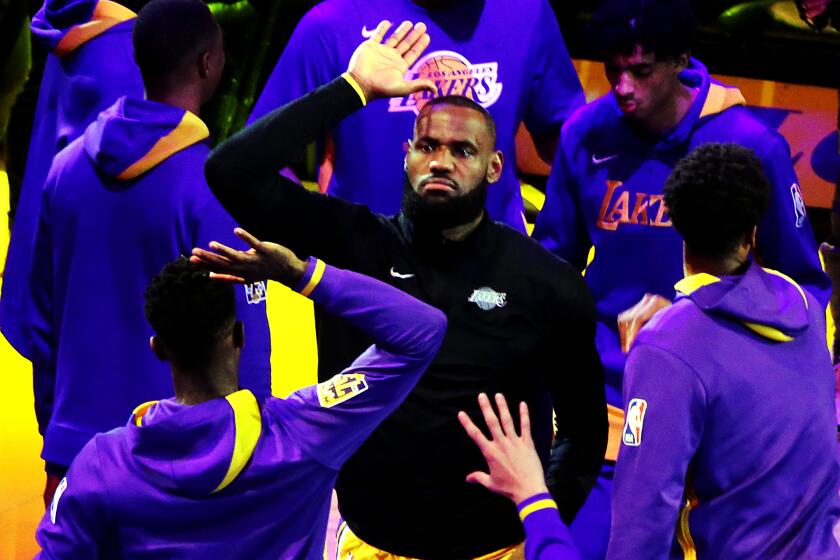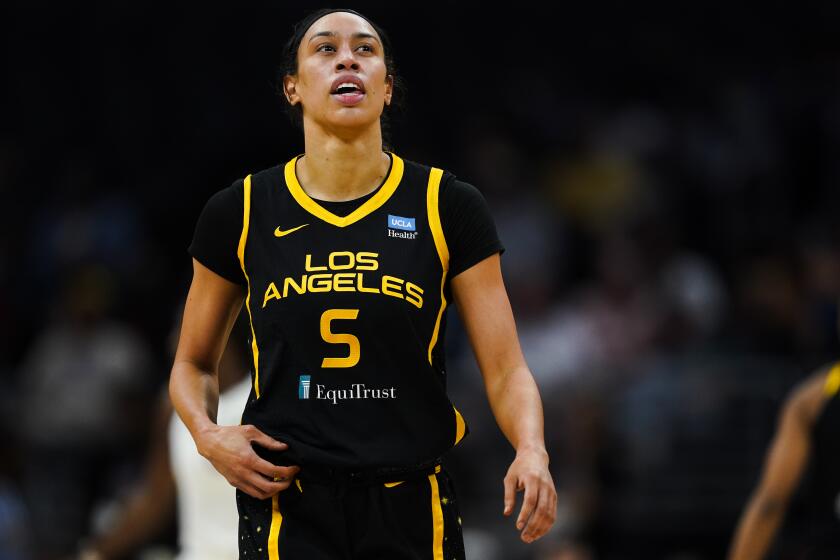Ex-Bookie Says Fix Would Be Easy
They are college kids playing basketball for nothing more shining than the moment.
They are easy targets.
The Fixable Four.
“It’s much easier to fix a tournament game than a regular game,” says convicted sports bribery felon Benny Silman. “There’s so much money bet on these games, who would know the difference?”
Enjoy this weekend’s spectacle in Atlanta. Embrace its emotion. But listen to this man.
Speaking from a phone in his mother’s New York apartment, Silman spins a frightening tale about the tenuous integrity of a sport in which everyone makes millions but the athletes.
Nobody is saying those bad passes were anything but mistakes, those lost dribbles anything but slips.
Yet Silman knows that in any college basketball game, anything is possible.
Silman knows, because he ordered those sorts of plays at Arizona State in 1994 in one of the most recent college gambling scandals.
The former campus bookie conspired with star guards Stevin “Hedake” Smith and Isaac Burton to fix four games that landed all of them in jail.
Speaking in print for the first time since being released from a halfway house after 31/2 years in federal custody, the 30-year-old Silman still marvels at the ease of the scam.
“I think, because of the importance of these games, and the whole atmosphere at this level, it’s less likely that any Final Four athletes would ever be involved,” he says. “But if they were, it would be easier to hide.”
He says look for the players who don’t have certain NBA careers.
“Those guys know that this is the only time they can make the money,” he says.
He says look not for balls thrown into the stands, but balls that bounce off the front of the rims, or off feet, or on the baseline.
“It’s never anything big, and it can only be one person doing it, but that’s enough,” Silman said. “That’s why college basketball is probably the best sport for this.”
He warns that as long as the sport contains billion-dollar TV contracts and million-dollar coaching deals while the players make nothing beyond the same scholarships given chemistry or music prodigies, it remains a gambler’s dream.
“Basketball players at this level, they are considered people of great stature, but they don’t have any of that money themselves,” he says. “Gamblers can give them that money. It becomes easy for them to accept it.”
As easy as one student doing a little dorm business with another student, which was the innocent setting for Silman’s complicated crime.
He was simply one of the campus bookies.
Smith was just another player who was broke.
They met at a keg party. Smith wondered what every big-time college basketball player eventually wonders: How come everybody was making money off his jump shot but him?
“Hedake was watching me count my money one day, and he said, ‘How can I get me some of that?’” Silman recalls. “I just looked at him. He looked back. For the longest time, we just stared at each other.”
Then, Silman recalls, Smith gave the subtle approval to make the deal that would ruin both of their lives.
“I’m just not going to lose any games,” Smith told Silman.
Once he started fixing, though, it was a promise he couldn’t keep.
In the first game, Smith scored a career-high 39 points, but Burton missed a couple of big shots and the Sun Devils didn’t cover the 15-point spread in a six-point victory over Oregon State.
A couple of days later, Smith went just cold enough for the Sun Devils to defeat Oregon by six points in a game with a 12-point spread.
The third game, Smith found fixing so easy, he missed 13 of 20 shots as the Sun Devils lost to USC despite being favored.
By then, Smith and Burton were sharing $20,000 per game while Silman was getting rich.
The scam finally ended when word leaked and gamblers swarmed over a late-season game against Washington. After watching the line change more than 40 times because of all the action, bookmakers from Las Vegas warned the Pacific 10 Conference of a possible fix.
After the Sun Devils missed their first 14 shots, the players were warned of suspicions at halftime. In the second half, everybody was forced to try hard, and the Sun Devils won in a romp, and all the gamblers lost.
None as much as Silman, who lost much of his young adulthood while spending three years in a federal prison in Yankton, S.D.
His story is the topic of tonight’s FX movie, “Big Shot: Confessions of a Campus Bookie.” But he no longer feels like a big shot.
While he says the movie is true, he seems embarrassed about it, and wouldn’t allow a movie publicist to be present on the phone during this interview.
When the movie’s star visited him in New York for research, Silman’s mother threw him out of the house.
“I’m making no money, this is hard on everybody, it’s awful for my parents to relive it,” he says.
He works as an assistant manager at a restaurant. He no longer gambles. He no longer even watches college basketball. Especially not the tournament.
“I won’t get in any pools, so the tournament isn’t that interesting to me,” he says. “I think it’s the same for a lot of people.”
It is, isn’t it? We worry about players gambling on tournament games, but aren’t many of us gambling on the same games? And if we couldn’t gamble, would we still watch?
We think basketball players--despite working what is essentially a full-time job that prohibits other employment--should be happy with their scholarships and keep quiet about being paid.
Especially when we’re betting on them.
*
Bill Plaschke can be reached at bill.plaschke@latimes.com.
More to Read
Get our high school sports newsletter
Prep Rally is devoted to the SoCal high school sports experience, bringing you scores, stories and a behind-the-scenes look at what makes prep sports so popular.
You may occasionally receive promotional content from the Los Angeles Times.







